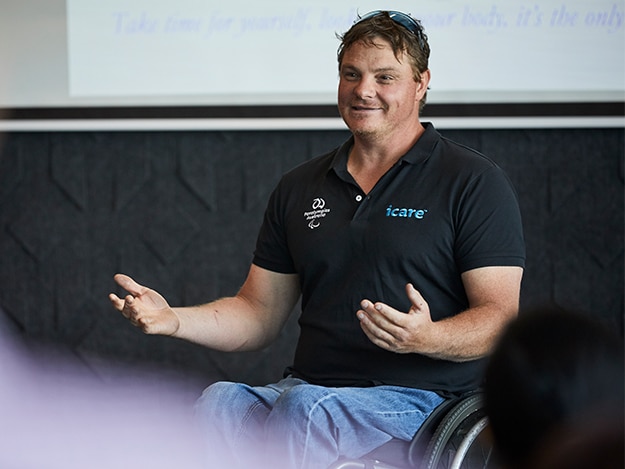Can lessons learnt during the pandemic help us build better workplaces in the future? This is a key question that will be tackled in an hour-long webinar session at 11am on October 27, hosted by icare New South Wales.
When we talk about the pandemic, we speak about the toll on lives, economies and health. We speak about social distancing and masks, and we debate the relative effectiveness of national health responses. But what we haven’t discussed on any larger stage is whether we can build a better workplace for tomorrow, using the lessons of this disaster.
In 2004 Ben was 22 years old and working as a coal miner when disaster struck. Machinery he was working on tipped, see-sawing his body into the roof, causing spinal cord damage and paraplegia.
Lying in hospital for weeks, Ben decided to redesign his life, carve a new future and take the learnings from his accident to improve safety conditions for other workers.
By 2009 after taking up rowing for fitness, Ben was competitively rowing all around the world, and took home a Paralympic title winning bronze in the World Rowing Championships. Following his success, he joined the Paralympic Speakers Program, to help workers and workplaces improve safety and risk management.
This month, Ben is one of three Paralympic speakers including Nigel Smith and Joany Badenhorst, sitting on a panel alongside social researcher and icare Head of Community Engagement, Andrew Ellery, and two injured worker case management specialists Krystal Lloyd and Blaise Scaife-Hall.
They’ll debate and discuss how we can use the learnings from this pandemic to create better workplaces in the future.
The pandemic has been a testing ground for flexible working. Prior to the pandemic, flexible working conditions were a ‘nice to have’ but not standard. Now, flexible working is what millions of businesses have instituted to survive. But will we pivot back when the plague has passed? Is that a good thing?
What we know for sure is that flexible working conditions open the doors to employment for many people, including injured workers, people living with a disability, working parents and carers. Flexible working creates more inclusive workplaces. It’s good for businesses too, with countless studies proving diversity in the workplace breeds innovation, reduced staff turnover, better decision-making results, faster problem solving and higher employee engagement.
But, are there downsides? How do we navigate the loss of social connectedness that flexible working conditions can create? How do we build resilient workforces and businesses post pandemic? How do we actively embrace change for the best results moving forward? How do we shape safe workplaces when we return to work? How do we sure up our businesses so that our people and our revenue stay safe in a world where a cough and a fever could mean contamination?
These are the questions the panellists will be tackling in the hour-long webinar session on October 27 at 11am, hosted by icare NSW. If you and are interested in being part of the discussion you can sign up for the complementary webinar, here.


